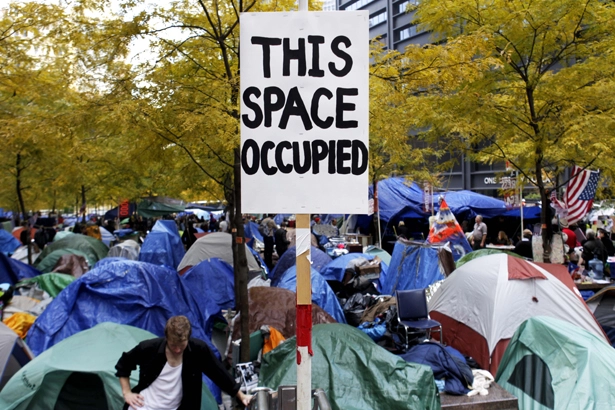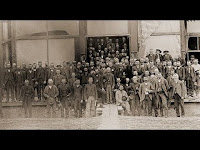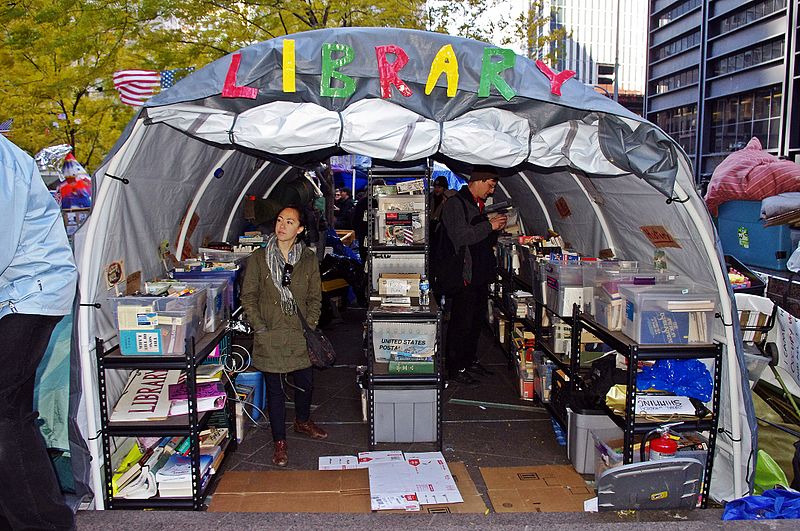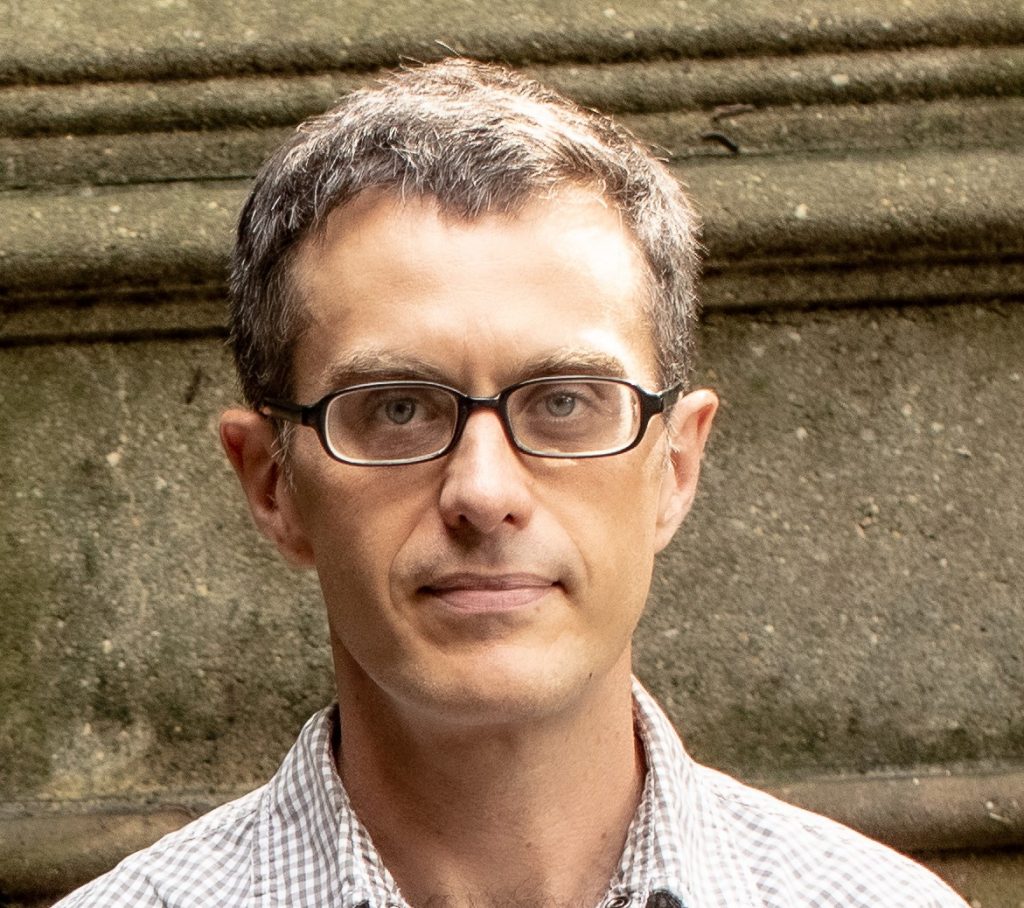[Cross-posted to In Medias Res]
Wichita, KS. Before 2021 comes to a close, let’s remember the many tributes, found in many year-end wrap-ups written just about exactly ten years ago (including one of my own), to the tens of thousands of people across our country, and the tens of millions of people around the world, who stood up in 2011, and fought for their local communities, and strove to reclaim their cultural strength against oppressive elites. I am, of course, talking about Occupy.
Obviously, not many people talked about Occupy–whether we mean Occupy Wall Street or any of its other many incarnations–that way, either at the time or since, whether they be those who were directly involved or those who merely cheered them or castigated them from the sidelines. With their their class-based talk of the “99%” challenging the “1%,” and their attacks on everything from oppressive student loans to growing wage gaps to spiraling health care costs, it was easy to assume that Occupy–in the United States at least–reflected the complaints of underemployed college grads with progressive politics, and nothing more. True, some people recognized that its radicalism was broader, more cultural and communal, than that–Jedidiah Purdy, for one, argued that OWS provided conservative as well as liberal, socialist, and anarchic lessons for us all, one of which (“It is sometimes necessary and appropriate to appeal to…[the] sentimental ties that join individuals in group”) I think sums up what happened in Zuccoti Park in New York City from September to November of 2011 as well as anything written about it since. What, after all, held together the people drawn to those protests, and inspired them to built those makeshift communities, more than the stories and testimonies which those suffering through the Great Recession stood up to share?
Most, however, look back upon the Occupy movement as a failure, a perhaps inevitable and in any case an embarrassing one. The essayist Freddie deBoer recently summed up the results of Occupy pithily, claiming that, given the apparent absence of attacks upon the power of capital in progressive circles today (I say “apparent” because deBoer–a wonderful writer but not, I think, at his best here–appears to base his judgment perhaps too much on that which he sees posted to Facebook, Twitter, and Instagram), one must conclude that OWS’s failure is “almost complete.” Even those deeply sympathetic to Occupy Wall Street’s general aims–specifically, challenging the financial and social power of the 1%–see it as having been a “leaderless, ultimately structureless collection of people,” unfortunately reflecting the tendency of those on the left to engage in “mindless repetition” and talk in circles in an “outwardly incomprehensible loop.” Those inclined to rant about the undeniably jargony woke-speech of many of those concerned with social justice today can easily connect the dots.
But such connections would miss the real point of Occupy, I think, and the real reason its messy provocations and demands have nonetheless continued to reverberate and recur within American discourse, shaping the way many of us think about economic equality and its disruptive effects. That lesson is contained less in what the protesters said, much less how they said it, and rather in what they did: they occupied. Meaning that their argument about the oppressive power over our lives, our family finances, our economic plans, and our communities’ fiscal integrity which the 1% wields was literally grounded in a claim to a space. A public space, wherein human beings can and should be able to democratically, deliberately determine the risks and rewards of their collective choices. An inhabited space, wherein those who make their homes and contribute to their cultures and simply live can act with the sort of freedom that not being subject to what Thomas Jefferson derisively called (in a recreation of a historically unsubstantiated but intellectually truthful dinner conversation) the “moneyed interest” and “New York stock-jobbers” allows. A space wherein one can insist that the laws of the market (especially as mastered by those whose wealth and advantages enable them to) are not, as Wendell Berry has insisted, “inevitable.” To claim such a space, and to occupy it in the face of the (elitely developed) rules which claim that the people, gathered together, simply cannot, should not, must not, act or organize or vote in certain ways, is and has been central to the arguments against finance capitalism which millions concerned about preserving their places and their choices in this world have made ever since the Industrial Revolution, if not earlier.
The centrality of occupying a space was key to the 19th-century Populist movement, for example, though it was rarely articulated as such. After all, the whole point of organizing at community granges in Kansas, Nebraska, Oklahoma, Colorado, Iowa, and Texas to challenge the power of the railroads was exactly because this alliance of farmers and ranchers and homesteaders wanted to defend the communities and the ways of life which had developed in those places, communities and ways of life that were being driven to ruin by manipulative railroad shipping rates and punitive lending and mortgage practices. They wanted their families and their children’s families to be able endure in place, and they knew that collectively fighting on behalf of the integrity of their places, rather than giving in to an individualizing acceptance of the undemocratic, unaccountable, why-don’t-you-just-sell-out-and-invest-in-stocks-instead-marketplace, was their only option. Such a fight would be inconceivable without a sense of place-ness. The better observers realized this parallel at the time, seeing in Occupy Wall Street in 2011 a model for a twenty-first-century, “open-source populism,” with the places where we stand and build lives for ourselves being much more inclusive and interdependent than was the case in the 1890s or 1930s, but nonetheless playing the same conceptual role of pointing us towards that which we want to conserve in the face of the atomizing effects of concentrated capital. While the ideologies and trajectories followed by other instances of populist occupation–including everything from the Capitol Hill Autonomous Zone in Seattle to the water protectors at Standing Rock to the Little Mountain Cohousing village in Vancouver to the Solidarity House Cooperative in Laramie–their commonalities remain: people inhabit places, and so fighting on behalf of the democratic treatment of people must, or at least should, incorporate a defense of a place, whether literal or metaphorical or both.
This is what Occupy Wall Street did: it made its rejection of financial rules visible and present in a particular location, and proceeded to speak and act and protest against all the ways in which economic oppression disrupts the freedom of people in their places by making that location into a human space–complete with publications and libraries and all sorts of other things which humans do. Still, the embodiment of a defense of the ability of people to freely build and securely maintain their neighborhoods, communities, and ways of life–in other words, their places–in the actual establishment of a place itself, however audacious and authentic and influential such an action may be, doesn’t lend itself to specific, programmatic plans of political action, any more than the neighborhood or community which anyone reading this lives in itself manifests a ready-made set of talking points or calls for legislation. That’s just not the way human spaces work. And so, of course, in terms of a direct legislative and organizational consequences, Occupy comes up short.
It was perhaps this utopian populist element of Occupy–the insistence that in these places, these people possess the sovereign power (or at least ought to) to determine for themselves how to live–that made it less than entirely admirable to some leftist and localists who either opposed it or thought it silly and inconsequential. For Michael Walzer, the long-time editor of Dissent and one of the most perceptive and respected voices on the American left, the Occupy movement was “heartening” but nonetheless primitive; the point of such movements, in his view, is to establish not a place but rather “a presence on the actual ground of democratic politics–where parties are organized and elections fought.” The aim that is, according to him, is not to occupy any real or conceptual territory, but to win that territory over to one’s side, which means specifically “to force a political party to adopt [one’s] program.” (The fact that Walzer was, at best, only grumpily tolerant of the enthusiasm which greeted Bernie Sanders’s own Jeffersonian and populist form of democratic socialism is, perhaps, revealing here.) Obviously, there is much truth here. Walzer, like just about everyone else deeply committed to a point a view in our democratic society–whether it be anti-tax libertarianism or democratic socialism or Christian integralism–wants to see that view itself established as a matter of law and policy and culture, and not merely as a organizing premise for families or neighborhoods or churches to make use of. This is, of course, a desire complicated by the realities of federalism and the many different, subsidiarian ways in which identities are articulated and authority distributed in our country, to say nothing of others. But it is also complicated by Walzer’s own deep belief in the necessity of starting with local, particular places.
Geoffrey Kurtz, a political theorist and scholar of Walzer’s thought, has written essays which explore this dynamic indirectly. While never mentioning Occupy Wall Street or Walzer’s comments upon it, Kurtz observes that Walzer’s ideas have long exhibited, to a sometimes greater and sometimes lesser degree, a tension regarding the experience of belonging. He agrees with other scholars that Walzer’s political philosophy is one which takes seriously the proposition that human beings construct and dwell within “moral worlds that contain the resources necessary for their improvement,” meaning that visions of more egalitarian, more fair, more free and just arrangements of the power otherwise claimed by the economic elite should not be top-down, all-or-nothing impositions. Rather, Walzer’s is a “decentralized democratic socialism,” strongly opposed to the administrative state, and thus one which “conveys the possibility of a socialist politics that does not worship progress and innovation.” But why then would Walzer not be an enthusiast for similar municipalist experiments around the world, for what his own journal labeled “experimental utopias,” which OWS was clearly an early, and perhaps incoherent, but nonetheless fully intentional example of?
Kurtz provides no direct answer–but he does suggest that Walzer is perhaps dispositionally “uninterested in understanding the core of that which he wants to conserve.” In an unpublished paper of his, Kurtz digs even deeper into Walzer’s oeuvre, insightfully pointing out the ways in which Walzer, a secular Jew, nonetheless implicitly acknowledges that “the mutual recognition of persons depends on a mystery,” one that Walzer himself is disinclined to explore or see fully committed to by any of the hypothetical socialist citizens he invokes, all while admitting that those mysteries of belief and identification and attachment “can be the moral basis for a political commitment in the sense that it orients and sustains those who recognize it.” While this is admittedly a large interpretive leap, I think that Kurtz can help us understand why it is, then, that even some of those whose particular socialist politics ought to align them strongly with the sentimental and local and communal form which Occupy’s protest against economic exploitation took, saw it nonetheless as an impressive yet fundamentally childish step, rather than a model to be embraced. To put it crudely, and probably a little unfairly, but perhaps nonetheless accurately: such thinkers probably aren’t believers…while holding up a sign, sitting at a lunch counter, sticking a flower in a gun, setting up a tent, and occupying a space in the face of state and corporate power is an act of utopian belief and faith. A belief, to go back to Berry’s insight above, that something may not be–and should not be accepted as being–an economic, and therefore social, inevitability.
In reference to the aforementioned “experimental utopias,” perhaps the best comparison with Walzer’s–perhaps limited but still clearly wise–approach to conceiving of a more egalitarian politics is the arguments of Murray Bookchin. The contributions of Bookchin and Walzer (left and right in this photo) occupy very different corners of the radical democratic quadrant of American thought, despite many similarities–their concern for pluralism, their respect for communities, and their suspicion of efforts to take the struggle against capitalism out of the hands of ordinary people. Bookchin, who would have been 100 years old this year, was of a different generation and orientation than Walzer. Whereas the latter made his mark primarily in the post-Vietnam era of Ronald Reagan, fighting within the Democratic party for what the founder of the Democratic Socialists of America, Michael Harrington, called “the left wing of the possible,” the former’s fights on behalf of what he came to call “social ecology” and “communalism” were fought outside of either of the dominant political parties in America, both of which were transforming throughout the 1960s and 1970s, as the individualist, environmentalist, and technological waves which washed away the statist, post-WWII New Deal consensus began to emerge. Fundamentally, though, the key difference may simply be that Walzer, in the wake of those waves, has long insisted that taking the energy they unleashed and using them to build political agendas and structures is the only radical politics worthy of the name. Anything other than that, however deeply felt and expressed, is mere play-acting.
That warning should never be entirely dismissed by those who believe another world is possible; as any reader of the Epistle of James can tell you, belief needs organization and structure to bring possibilities about. But that belief, that confidence in anarchic actions and democratic demands and communal alternatives, must come first. And moreover, as Doug Henwood observes in his own conflicted-yet-deeply-appreciative recollections of OWS, anarchic actions, properly understood, do (or at least can) have a structure to them, and need not be nearly so disconnected by constant discussion from concrete action as Occupy and other utopian experiments have stereotypically been seen to be. Bookchin’s insights into how people can truly, freely–while still methodically!–make the places they occupy into transformative spaces is one that needs to be remembered by localists and radicals and everyone who cares about the common good today, 10 years on. As one activist put it, invoking Bookchin’s faith in ecologically conscious communities which reject the supply chains of global capital, the legacy of Occupy Wall Street was “something that touches our deepest spiritual yearning,” in a very un-Walzerian sense; “its practice says: ‘We will no longer live in hatred and competition. We will live in love and community.'” In our deeply divided current moment, is there any better model to carry into our (hopefully) increasingly local-community-focused, (hopefully) increasingly egalitarian, (hopefully) increasingly small-d democratic future? I think not.









1 comment
Elias Crim
Beautifully said–and the comparison of Bookchin and Walzer is very helpful.
One interpreter of OWS called these occupations–almost 100 cities and towns had one– “a canvas for an image of another world.” This kind of pre-figurative, veil-lifting exercise was an attempt to recapture the social–which requires (as your piece emphasizes) a place.
Moreover, instead of hearing a list of political demands, we witnessed a push for grassroots democracy and reclaiming public space. “We came for a protest and stayed for a school,” one occupant of Zucotti Park remarked. I’ve also seen it argued that the experiences of OWS did indeed lead to change–in the Chicago teachers’ strike and the first strike of Walmart workers, along with Strike Debt and Rolling Jubilee.
As one prescient occupier shouted at the time: “This is just practice: occupy everything!” Maybe we’re getting there.
Comments are closed.